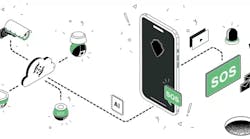VideoSave Inc., has removed a barrier to widespread video security by enabling all Macintosh computers (as well as Windows and LINUX machines) to display its video surveillance images.
VideoSave's video surveillance service differs fundamentally from conventional on-site DVR-based systems. Video frames are encrypted and date-and-time stamped, then transmitted via the Internet to the utility's digital storage, where the video assets are placed under the care of VideoSave's I.T. professionals. Central "video vault" storage accommodates surveillance images from VideoSave's entire client base, providing benefits and capabilities not feasible with conventional onsite DVR storage.
Owing to the surveillance infrastructure's economies of scale ' with Terabyte memory cost shared among all clients ' VideoSave can provide low priced video storage. Even for multi-year archiving, clients pay only a small monthly fee. VideoSave also offers system performance management for a modest additional increment. All client cameras and communications networks are then closely monitored, with malfunction alerts transmitted by phone and email. To minimize downtime and loss of critical video, VideoSave sends repair authorization directly to the service technician.
Strengthen Lawsuit Protection
Video images, like fingerprints and DNA data, may be called upon as evidence in a lawsuit. All centrally stored video frames are date-and-time stamped, creating a legal chain of custody for client videos. In addition, professional I.T. management establishes a vital third party provenance for clients' stored video assets. These safeguards provide a bulwark against aggressive cross examination of video evidence, should property management become a litigant in slip-and-fall or other legal action.
Video Survives Fire, Robbery
By transmitting camera frames directly to the offsite video vault, VideoSave provides a benefit not normally feasible with onsite DVR technology. Client video assets are placed beyond reach of tampering or sabotage. Surveillance data remains intact, despite fire, flood, hurricane or other property destroying disaster. And store robbers can no longer cover their tracks by removing surveillance videotape or an onsite digital video recorder.
View All Video On Single Monitor
Thanks to VideoSave's innovative technology, clients can choose to send their legally critical video to VideoSave's high security offsite video vault, while storing low priority video on an onsite server. The technology also enables clients to use IP and conventional CCTV cameras interchangeably. Clients can also view both onsite and centrally archived video on a single Mac screen; in fact with one login, all video from an owners' geographically separate properties can be displayed on a single monitor.
Connecting The Dots
By comparing videos from properties at different locations on a single monitor, viewers can connect the dots and diagnose common felony patterns. Personnel economies are also possible, through the hiring of a single security dispatcher to supervise multiple properties. The central dispatcher pinpoints incipient trouble spots and then directs security intervention by cell phone to the location where trouble is brewing.
View Multiple Thumbnail Images On Single Screen High speed Internet connections enable monitors to display up to 100 thumbnail images on an individual screen. Viewers can enlarge selected image for detailed scrutiny. Date-and-time stamped video frames also permit critical video sequences' pinpointed to the second'to be selected and displayed, even in multi-year storage contracts. Video viewing rate can be raised tenfold, permitting a 30 minute video record to be scanned in 3 minutes.
Provide Short-Term Passwords
The inherent "smarts" of VideoSave's surveillance infrastructure provide a singular benefit not available with regular DVR-based systems. Clients can issue short-term passwords that expire after a predetermined period. Temporary employees, accident investigators, crime witnesses, can view specific videos for limited periods. Clients can provide police officers with short-term passwords, enabling enable them to pursue further investigation back at the precinct.
Conclusion
By functioning as a surveillance utility'with logical parallels to central electrical generation and distribution'VideoSave moves video surveillance into the 21st century. Why would a rational organization maintain a basement generating plant when the local utility's economies of scale enable it to supply dependable, hassle-free electricity at lower cost?
Management's Observation
Steve Shaer, VideoSave CEO, refers to the trend'driven by today's litigious society'towards long term storage. "With conventional monthly DVR storage," Shaer says, "equipment malfunction merely sacrifices a small "window" of video evidence." "But modern DVRs are beginning to offer terabytes of memory for long term storage," he continues, "which means that DVR breakdown can now cause serious loss of surveillance coverage." "In contrast, Shaer says, VideoSave's equipment monitoring, plus remote backup of the video vault's entire content, limits clients' loss to a single day's events."

